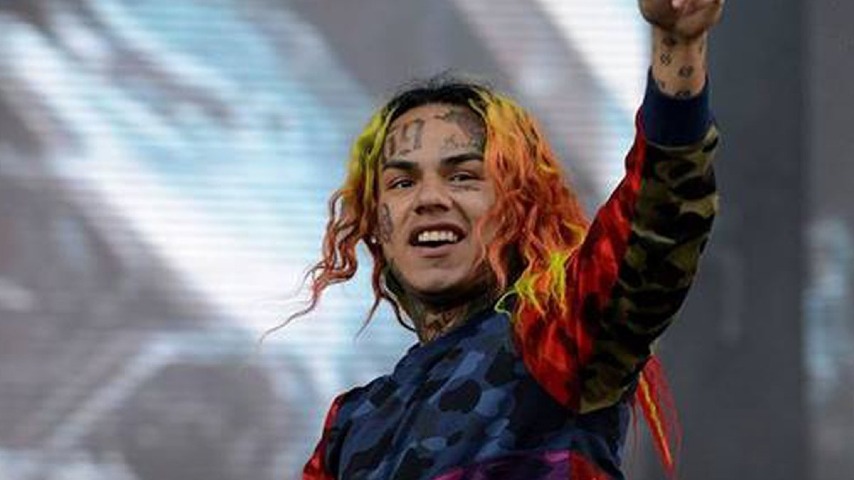Tekashi69 is the Jackass of rappers. Physical shock value gets you in the door and, once you’re in, you either start unpacking what’s underneath or simply sit back and enjoy the self-destruction. The rodeo clowns hitting each other in the balls and the delivery-boy-turned-rapper with the rainbow hair, face tattoos, and DIY clothing printed with profanity have one attention-seeking goal in mind. “What I saw from him from the gate is that he’d do whatever to be famous,” says rapper Bodega Bamz in Hulu’s documentary 69: The Saga of Danny Hernandez. The problem isn’t that the film is as shallow as its subject, but that its efforts to find substance beyond the style are handicapped by its broad format.
Directed by Vikram Gandhi (Barry) and released without marketing fanfare straight to the streaming service, 69 stops being the story of Danny Hernandez relatively quickly. Interviews with Sara Molina, the mother of his daughter and survivor of his domestic abuse, give a glimpse into his life before the image, but the doc spends most of its time on the same sensational highlights as the headlines as it chronologically tracks the rapper’s career from the bodega to Billboard.
This is partially because, the film argues, the line quickly disappeared between Hernandez and his ridiculous, violent, over-sexed rap persona (something that FX’s Dave had sharp commentary on earlier this year). The manic rapper tries to evoke The Dark Knight’s Joker during one of his music videos, but by all accounts he’s more of Joker’s version of the Batman villain: he’s not here with a plan to see the world burn, he’s here with nothing but the need for attention. But this isn’t a superheroic effort to understand him.
Assembled with new interviews and a flood of archival footage—the good thing about making a doc about someone that won’t appear in your film is that if they owe their fame to Instagram and Vine, there’s plenty of video out there—69 is surprisingly (ahem) by-the-numbers considering its bombastic subject matter. Aside from opening titles emblazoned upon a tattooed body, it tries to shove elements that are purposely sensational into a toned-down investigative-style doc. Things like Gandhi’s simple narration and traditional aesthetic (slow pans over court documents, basic needle drops like “In the Hall of the Mountain King” to show something spiraling out of control) clash so strongly with the bleeding edge multimedia rap game as to undermine its commentary.
Assigning labels to Tekashi like “troll,” something it does during its numerous chapter titles, makes the doc sound like it’s giving the rapper the same kind of cynical excuse some organizations use to write off 4chan members or Twitch chat swatters. After pleading guilty to “use of a child in a sexual performance,” which even more heinous than it sounds, and screwing his creative partners out of money, the rapper linked up with the Bloods in order to put some actual power behind his posturing. Inherent in the story of Tekashi is the story of his various organizations—those he used for clout; those using him for money—which he either treated like the Riff Raff quote, “My main goal is to blow up then act like I don’t know nobody,” or snitched on when held accountable for his actions. And it’s the disposable “anything for attention” attitude at the heart of this—an attitude that developed online.
Midway through the film, Soundcloud co-founder Eric Wahlforss (after helping define the term “Soundcloud rap”) chuckles as he explains the scandal around the young, disillusioned, fame-hungry musicians that followed in Tekashi’s footsteps: “we had the most popular artist on Soundcloud and then next week he was dead from an overdose.” The doc understands that social media, and data-driven platforms in general, are responsible in some way for Tekashi and his ilk, but only briefly makes the connection between the need for virality and the increasingly dangerous, asocial behavior it incentivizes. “Extreme characters get amplified” on social media, Wahlforss explains. When shock’s all you’ve got, the shock has to keep increasing or else everyone that’s been watching will be too numb to stay interested. But the access and egalitarianism available on social media—hell, even its implications for those looking to replicate Tekashi’s success—aren’t touched on with any depth.
In fact, the doc’s killer, sit-up-in-the-chair moment has little to do with Tekashi and is the furthest thing from a Technicolor dye job. In the last ten minutes of the film, it’s revealed that, in the months leading up to the rapper’s final gang-related arrest (which led to all the snitching), his driver became an informant to the government after being detained by ICE. With such a potent piece of intel, it’s no wonder the doc is confused about whether it should be a true-crime story or an episode of Behind the Music. Caught in between, its insight into both Tekashi and the recent trends of rap leaves plenty to be desired—especially its concluding paragraph-style attempt to tie the rapper to Donald Trump—leaving 69 as a relatively thorough rubbernecker giving internet points to one of its most desperate addicts.
Director: Vikram Gandhi
Release Date: November 16, 2020
Jacob Oller is Movies Editor at Paste Magazine. You can follow him on Twitter here: @jacoboller.
For all the latest movie news, reviews, lists and features, follow @PasteMovies.




